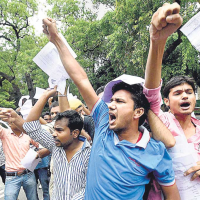UPSC Protests Continue Despite Govt Caving in Over English Proficiency
 UPSC aspirants protesting in New Delhi (photo: PTI)
UPSC aspirants protesting in New Delhi (photo: PTI)
The NDA administration’s piecemeal attempt to cool the protests over the Union Public Service Commission (UPSC) examination has backfired, with students still unhappy that the government has merely excluded the marks earned in English from being counted in the civil services aptitude test (CSAT), and not actually scrapped the test itself.
Conducted in three stages – preliminary, main and interview – the civil services examination selects candidates for the prestigious IAS, IFS and IPS as well as other branches of the civil services. The current controversy is over the preliminary stage, which was introduced in a new CSAT format in 2011.
The Opposition has demanded the scrapping of the examination scheduled on August 24, claiming that the existing format is loaded against non-English-speaking aspirants. These regional parties are playing to their domestic audience in Hindi-speaking states - Uttar Pradesh and Bihar - that see the largest number of aspirants for the civil services.
Protestors have used statistics to claim that the percentage of Hindi-medium students has dropped since CSAT was introduced. But statistics indicate that Hindi-medium students fared poorly even in 2010, the year before CSAT was introduced. After the drop in 2011, Hindi-medium students put up a far better show in 2012, indicating that they had adjusted to the changed format.
The government has now come under flak from former bureaucrats and social scientists for diluting the test of English proficiency. They claim that the decision taken on Monday to drop the weightage given to English was taken with one eye on the upcoming state elections in Bihar.
"The government has failed to reason with the agitating students and speak the truth: that English comprehension contributes to an effective public service. Instead of diluting the proficiency levels for English, the government could have come up with the idea of providing free English coaching to civil services applicants to help raise their comprehension skills," former cabinet secretary Naresh Chandra told the Times of India.
He also pointed out that the government has encroached on the UPSC's autonomy.
“By not letting the UPSC (which favoured maintaining the status quo) have the final word, the government has diluted its authority. The UPSC is a constitutional body, not a subordinate office of the DoPT (Department of Personnel & Training),” Chandra pointed out.
D Shyam Babu, senior fellow, Centre for Policy Research, said that without knowledge of English, a pan-India civil services would be impossible, and to be effective, administrators needed to be conversant in the local language as well as in English.
"Instead of striving to bring all sections on par in terms of merit, we are now trying to bring down merit to the lowest common denominator…A social group, or candidates from rural areas, deserve some special treatment. But the demand to scrap aptitude tests amounts to declaring that governance does not need any aptitude," Babu told TOI.
- Top Stories
- Controversies
- Where is the Money Going?
- India and the World
- Appointments and Resignations
- Unusual News
- Latest News
- India College Chain’s Expansion into U.S. Draws Opposition from Massachusetts Officials over Quality of Education
- Milk Shortages in India Tied to Release of New Movies Featuring Nation’s Favorite Stars
- Confusion Swirls around Kashmir Newspaper Ban in Wake of Violent Street Protests
- Polio-Free for 5 Years, India Launches Vaccine Drive after Polio Strain Discovery
- New Aviation Policy Could Increase Service, Lower Ticket Prices






Comments